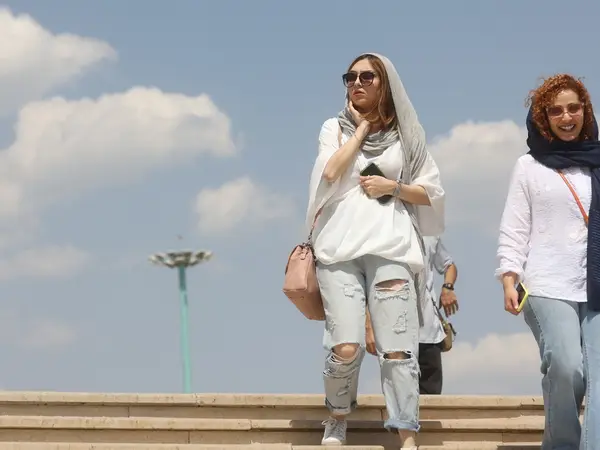Heated debates over a new bill about how to deal with women who refuse to observe compulsory hijab continues inside and outside the Iranian parliament.
The bill is not forceful enough for hardliners, because it bans religious conservatives from confronting women who don’t cover their heads. The bill mainly relies on cash fines to force women to wear the hijab.
Part of the regime in Tehran fears strict and forceful enforcement of hijab might trigger another round of protests, similar to last September when a 22-year-old woman died after her injuries in ‘morality police’ custody.
While some hardliners demand harsh treatment of bad-hijab women, Vice President for Legal Affairs Mohammad Dehghan told reporters in Tehran on Monday: "We wish to avoid making hijab a pretext for further deepening divides and disputes in the country." He added: "We are thinking of using the issue as a basis to bring about national solidarity."
Dehghan said that the current bill, which has been criticized by some hardliners as being focused on levying monetary penalties rather than confronting women in the streets, has been prepared by the Judiciary and the administration has simply tried not to change it dramatically.
Referring to the criticisms, Dehghan said, "After the recent protests which were organized by foreigners, the issue of hijab must be dealt with a more comprehensive approach." He probably meant that the government needs to take a pragmatic stance to avoid further unrest. He reiterated that the government believes in "a cultural approach" to the issue.
Dehghan, however, made it clear that the government agrees that celebrities who promote the idea of "hijablessness" should be dealt with legal prosecution. He added that the security forces will deal with those who promote anti-hijab ideas based on foreign views. In other cases, law enforcement will simply advise women to observe the hijab. If they accept the guidance, then that is all, but if they insist to defy the hijab, they will be fined.
One of the staunch critics of the hijab bill happens to be President Ebrahim Raisi's father-in-law Ahmad Alamolhoda, the Friday prayers Imam of Mashhad. Lawmaker Jalal Rashidi Koochi quipped that Raisi should take back the hijab bill from the Majles and hand it over to Alamolhoda for further review before giving it back to the parliament.
Koochi charged that "the bill in its current form is all about arresting and fining women. If Alamolhoda wishes to make any change in the bill, he should not criticize the parliament as he did. He should instead address his complaints to his son-in-law Raisi." Alamolhoda had earlier called on the Majles not to ratify the bill as it will promote lack of hijab.
Koochi however criticized the bill for lacking any provision that would encourage women to observe the hijab. "The bill is mainly about if you do this, you have to pay this amount," Kooch said.
During the past week, many conservatives and hardliners harshly criticized the bill. The hardline editor of Kayhan daily Hossein Shariatmadari said "It is funny that the police is only allowed to send text messages to women telling them that they have been seen without headscarf. This bill cannot enforce the hijab."
Former Deputy Judiciary Chief Mohammad Javad Larijani said: "If someone sees a naked woman standing behind the window, he should have the right to call the police." Meanwhile, responding to Iranian politicians who have called for holding a referendum about hijab, Larijani said that this will violate the Constitution of the Islamic Republic.
Lawmaker Mohammad-Taghi Naghdali, the secretary of the parliament's legal committee, in a video that quickly went viral suggested harsh punishments including lashes and deprivation from social rights as well as heavy fines for women who refuse to wear the compulsory hijab.
Calls for harsher punishments than what is called for in the hijab bill continue by seminary clerics, Friday Prayer Imams and other hardliners in various parts of the country, while the number of women defying hijab has been on the rise in the streets during the past 8 months since the start of Women, Life, Freedom movement in Iran, despite the official ban on the entry of hijabless women to academic centers and administrative buildings and even subway stations.
